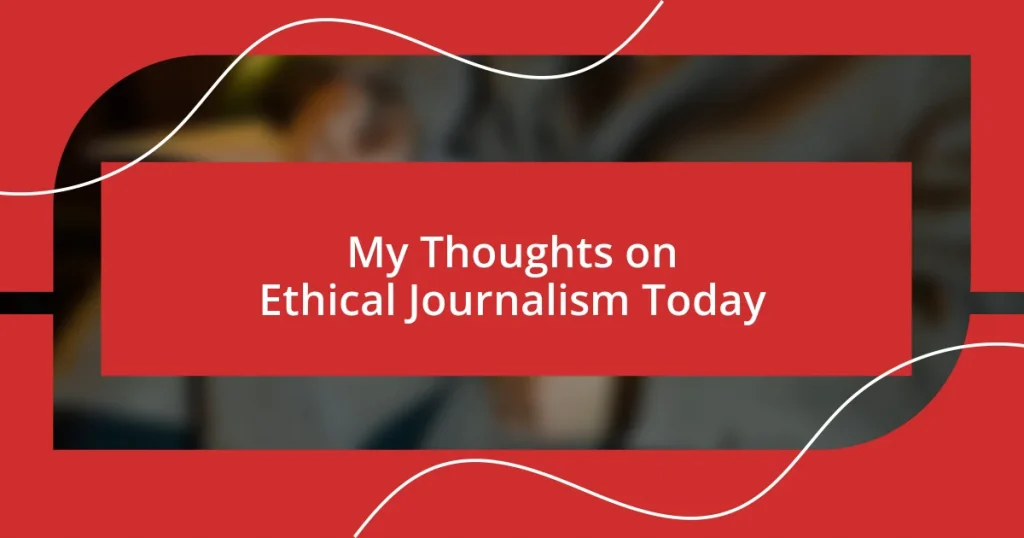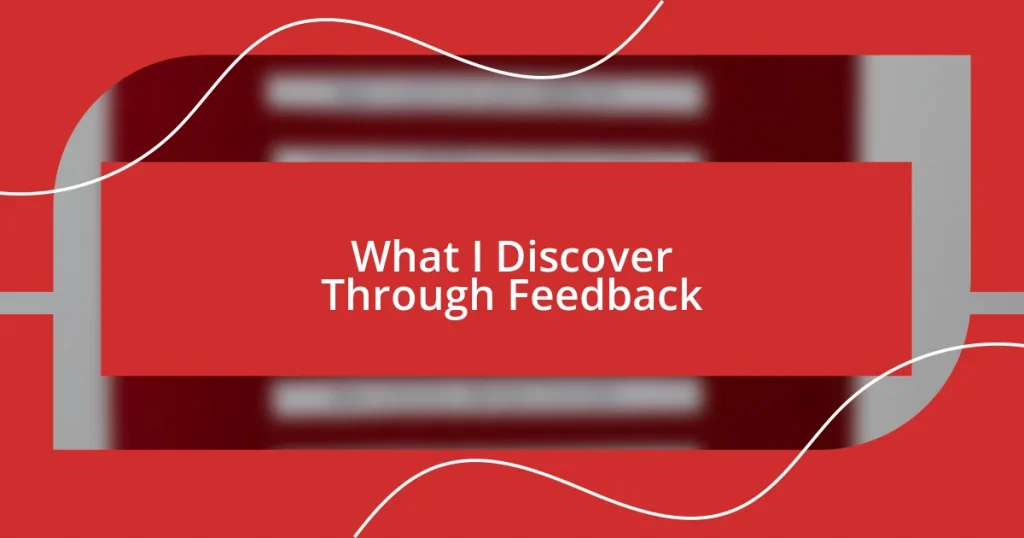Key takeaways:
- Ethical journalism requires journalists to prioritize accuracy, fairness, and transparency to maintain trust and accountability.
- The rise of social media and external pressures complicate ethical reporting, making it vital for journalists to balance speed with accuracy.
- Future ethical practices will increasingly focus on transparency, technological tools for verification, and the mental health of journalists.
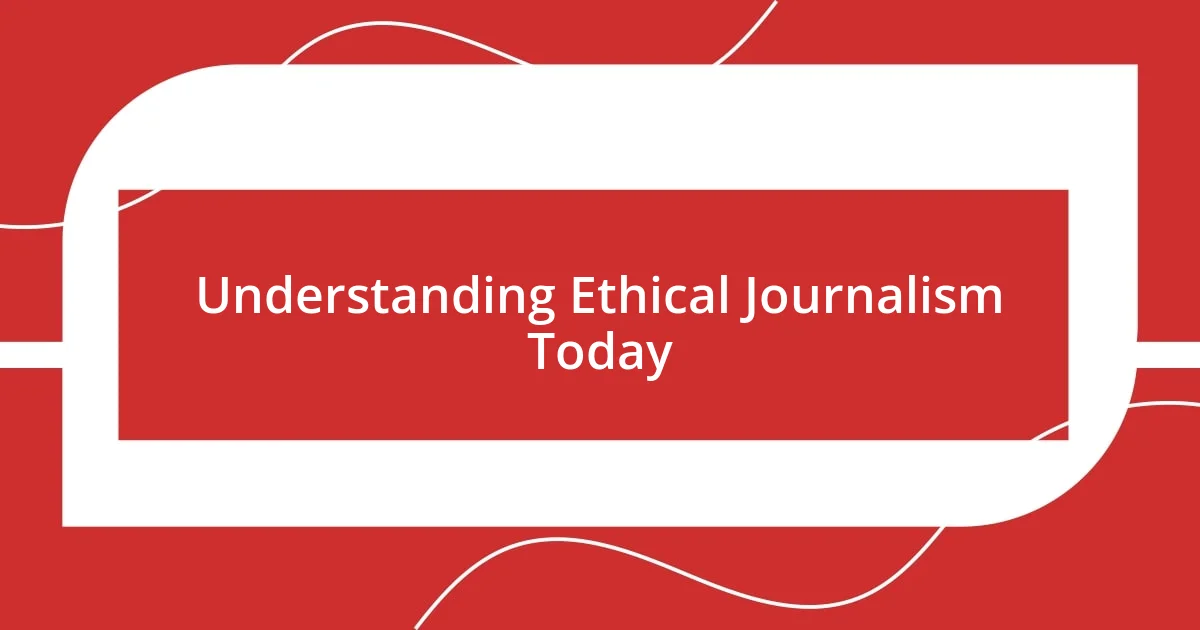
Understanding Ethical Journalism Today
When I think about ethical journalism today, I can’t help but imagine the challenges journalists face in a world overflowing with information. It’s no longer just about reporting facts; it’s about discerning the truth among a sea of opinions and biases. Can a journalist remain impartial when there are so many external pressures pushing them in one direction or another?
I’ve seen firsthand how a single headline can sway public perception dramatically, often leading to misinformation spreading like wildfire. I recall a local story that was sensationalized and created unnecessary panic in my community. It made me realize the immense responsibility journalists hold—not only to provide facts but also to contextualize them and offer nuance. In that moment, I understood that ethical journalism requires a commitment to fairness and accuracy.
Moreover, the rise of social media has added layers of complexity to ethical practices. It’s astonishing how quickly something can go viral, yet in our haste to share, are we compromising the integrity of our reporting? I find myself pondering this question regularly, especially when I see colleagues grappling with the balance between speed and accuracy. It reminds me that ethical journalism is an ongoing journey that demands vigilance and reflection.
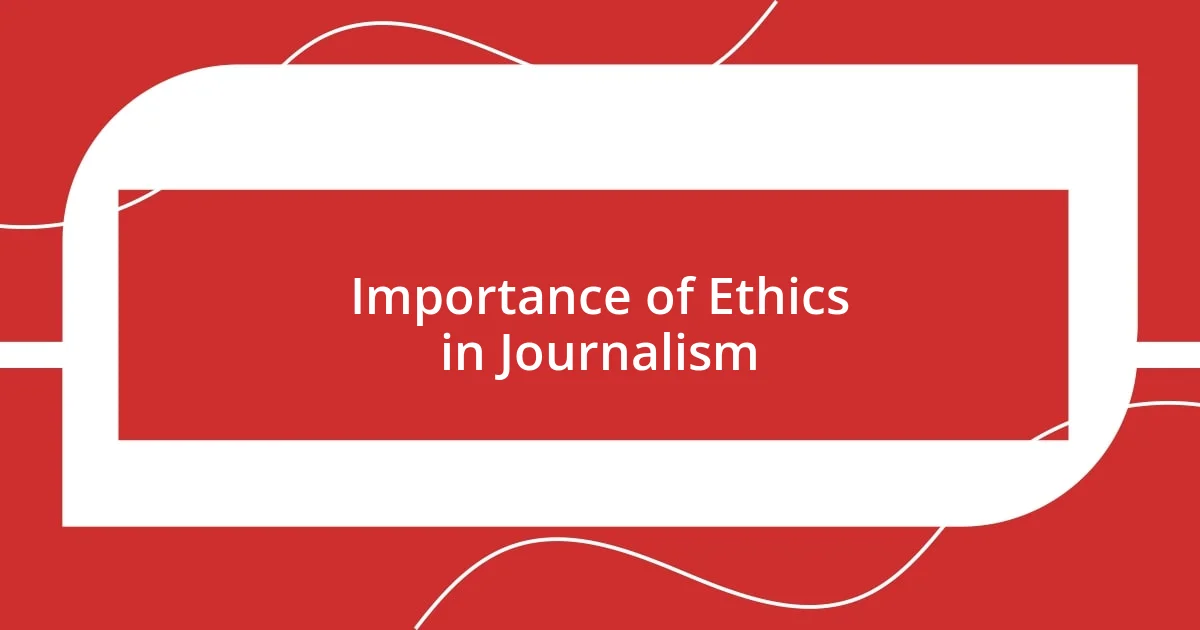
Importance of Ethics in Journalism
Ethics in journalism is crucial because it upholds the core values of truth and accountability. I remember a time when a trusted news outlet reported a breaking story without thoroughly verifying sources. The fallout was significant—the misinformation not only damaged reputations but also deepened societal divides. This experience vividly reinforced for me that ethical standards are not just guidelines; they are the very foundation of responsible reporting.
Here are a few key reasons why ethics matter in journalism:
-
Building Trust: Ethical journalism fosters a trustworthy relationship with the audience. When readers believe in the integrity of the information they consume, they are more likely to engage with the news.
-
Promoting Objectivity: By adhering to ethical standards, journalists can work to minimize personal biases that might color their reporting, helping to present a balanced view of events.
-
Encouraging Accountability: Ethical journalism holds individuals and institutions accountable by scrutinizing their actions and providing the public with an informed perspective.
-
Safeguarding Vulnerable Voices: Ethical practices ensure that marginalized communities receive fair representation in the media, promoting diversity and understanding.
Reflecting on the evolution of journalism, I’m struck by the immense responsibility that comes with crafting narratives that shape public perception. When journalists prioritize ethics, they contribute to a more informed and empathetic society.
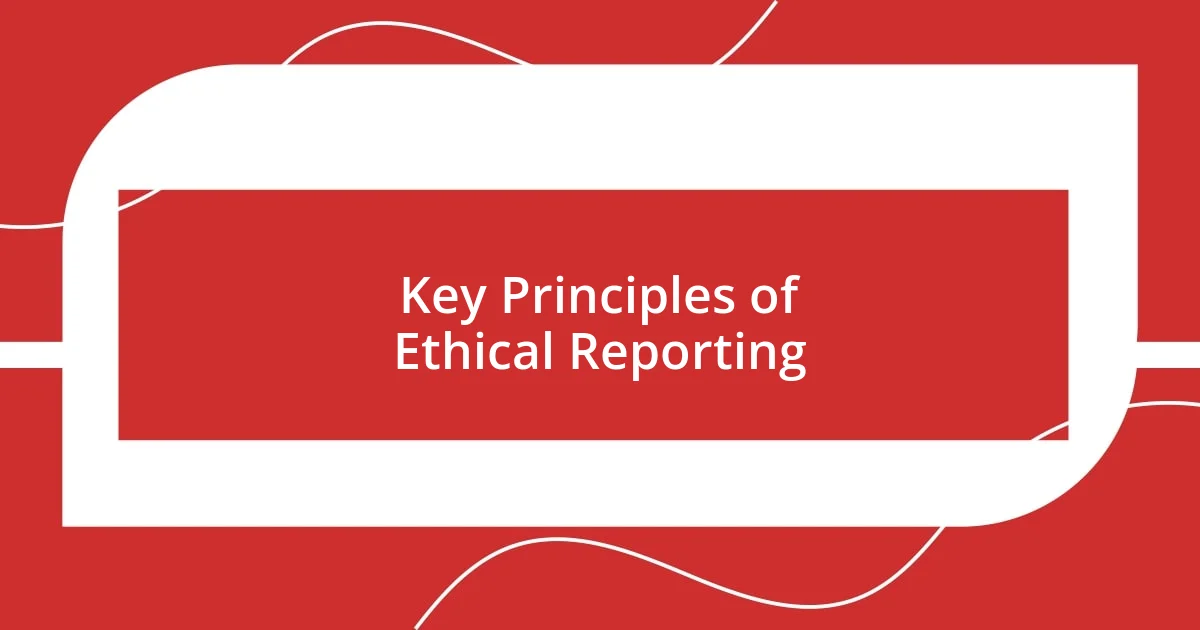
Key Principles of Ethical Reporting
The key principles of ethical reporting serve as guiding stars for journalists navigating the complex landscape of today’s media. First and foremost, accuracy is paramount. In my experience, I’ve had encounters where a minor error in a report snowballed into significant misunderstandings, illustrating how vital it is to double-check facts and verify sources before publishing. I’ve learned that we owe it to our audience to present a truthful narrative, even when the facts may not align with popular opinion.
Another essential principle is fairness, which echoes the idea of giving all sides a voice. I recall a time when I reported on a contentious local issue, and I felt the pressure to side with one faction. However, I made a conscious effort to interview representatives from both sides. It was enlightening to see how balanced reporting fosters dialogue and mutual understanding. This experience reinforced for me that fairness isn’t just an ethical obligation; it enhances the credibility of our work.
Lastly, I believe transparency plays a crucial role in ethical journalism. When journalists openly acknowledge their sources and methods, it demystifies the news-making process. I’ve found that being upfront about potential biases can bridge gaps with readers. This relationship of trust, built on honesty, empowers the audience to engage more thoughtfully with the information presented to them.
| Principle | Description |
|---|---|
| Accuracy | Ensuring that all facts are verified before publication to maintain credibility. |
| Fairness | Giving all relevant parties a chance to present their perspective, fostering balanced reporting. |
| Transparency | Being open about sources and methods, helping to build trust with the audience. |
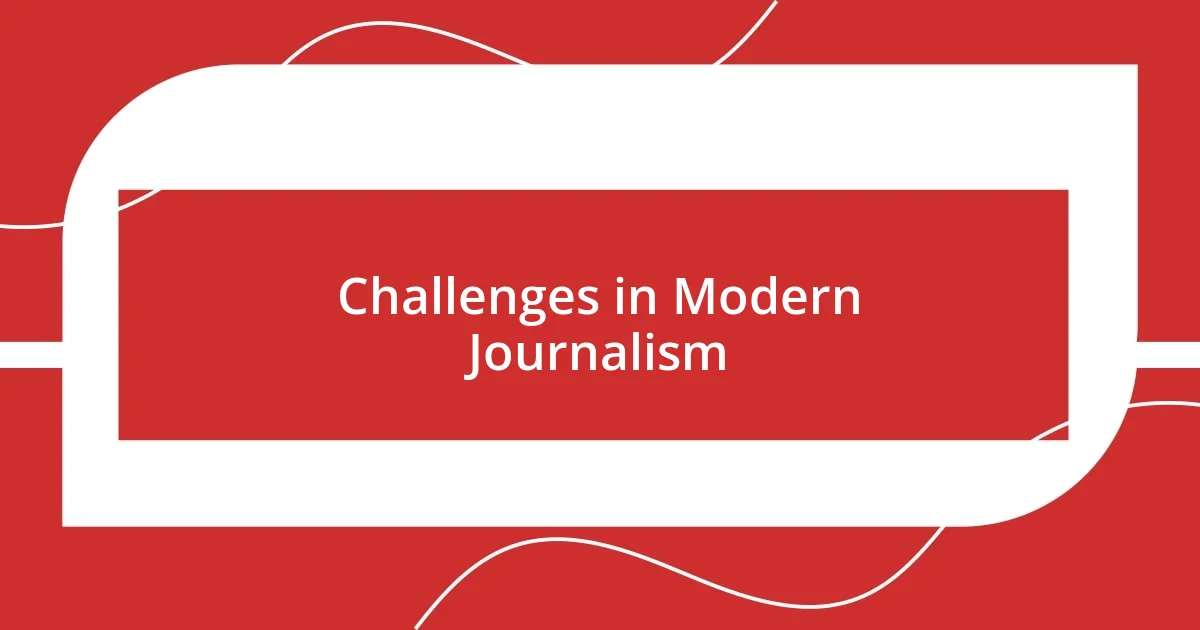
Challenges in Modern Journalism
One of the most pressing challenges in modern journalism is the overwhelming influx of information. Given today’s 24-hour news cycle and social media dynamics, I often find myself grappling with what to report. Have you ever felt lost in a sea of headlines, unsure which ones to trust? I certainly have. This environment can lead to a rush to publish, which significantly heightens the risk of spreading misinformation, and it’s imperative for journalists to remain vigilant in verifying facts amidst the noise.
Another significant hurdle is navigating the influence of political and corporate interests. I’ve seen firsthand how external pressures can interfere with journalistic independence. I recall a project where advertisers tried to sway the editorial content. It was a stark reminder of how vital it is to uphold integrity in the face of such challenges. When journalists fail to resist these influences, they risk losing the very trust that engages their audience.
Finally, there’s the threat of harassment and safety concerns, particularly for those reporting on sensitive issues. I remember an occasion when a colleague covered a protest and faced hostility from individuals who disagreed with the coverage. This encounter made me acutely aware of how essential it is for media professionals to prioritize their safety while staying committed to reporting the truth. It begs the question: how can we create an environment where journalists feel secure enough to do their jobs? It’s a complex issue that requires collective efforts from the media industry and society.
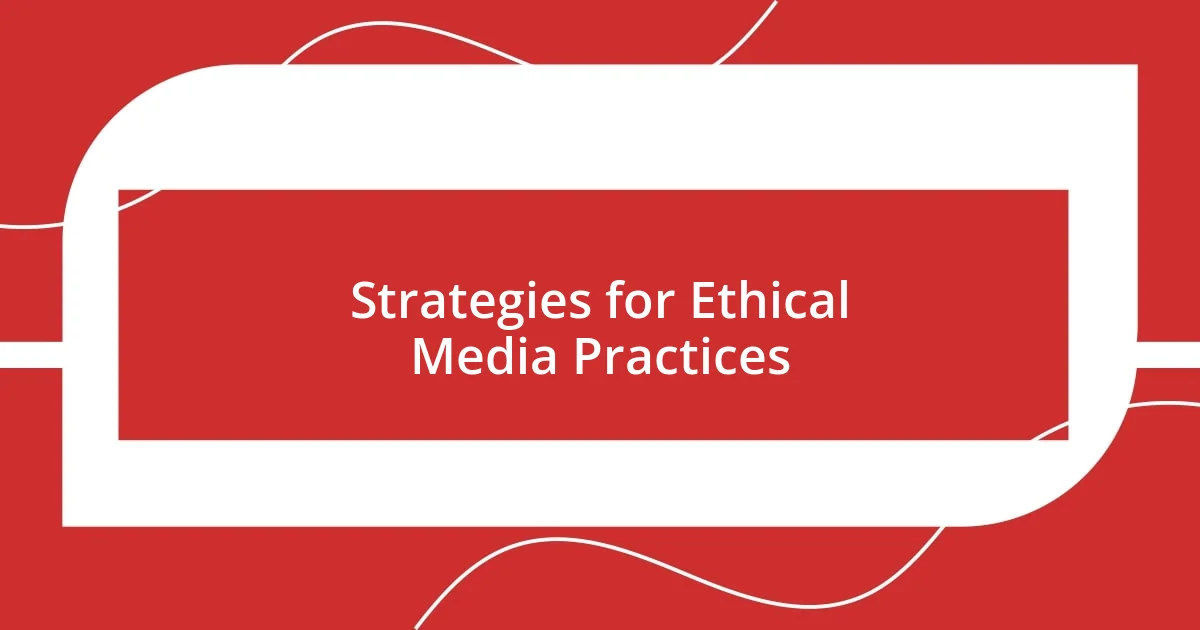
Strategies for Ethical Media Practices
Developing clear strategies for ethical media practices is essential in today’s fast-paced information era. One approach I advocate is instituting rigorous fact-checking processes. I remember a particularly hectic news day when I shared a breaking story that turned out to be inaccurate. That experience felt not only embarrassing but also put a dent in my credibility. I’ve since made it a point to advocate for the inclusion of dedicated fact-checkers in editorial teams, ensuring a safety net against the rush to publish.
Another strategy involves continuous education and training around ethical reporting standards. I often think back to the workshops I attended early in my career, where experts would discuss real-life case studies of ethical dilemmas journalists faced. Engaging with these stories helped reshape my perspective on how crucial it is to stay informed and thoughtful in our approaches. Have you ever had a moment where a lesson transformed your way of thinking? I know I have, and it’s made me take more intentional steps toward responsible journalism.
Lastly, fostering an environment of open dialogue within newsrooms is vital. In a past role, we implemented regular meetings where team members could voice concerns about ethical practices and share feelings about the content being produced. These conversations not only strengthened our team dynamics but also kept us accountable to one another. It’s such a powerful reminder that ethical journalism is not just an individual responsibility; it’s a collective effort that thrives on collaboration and respect.
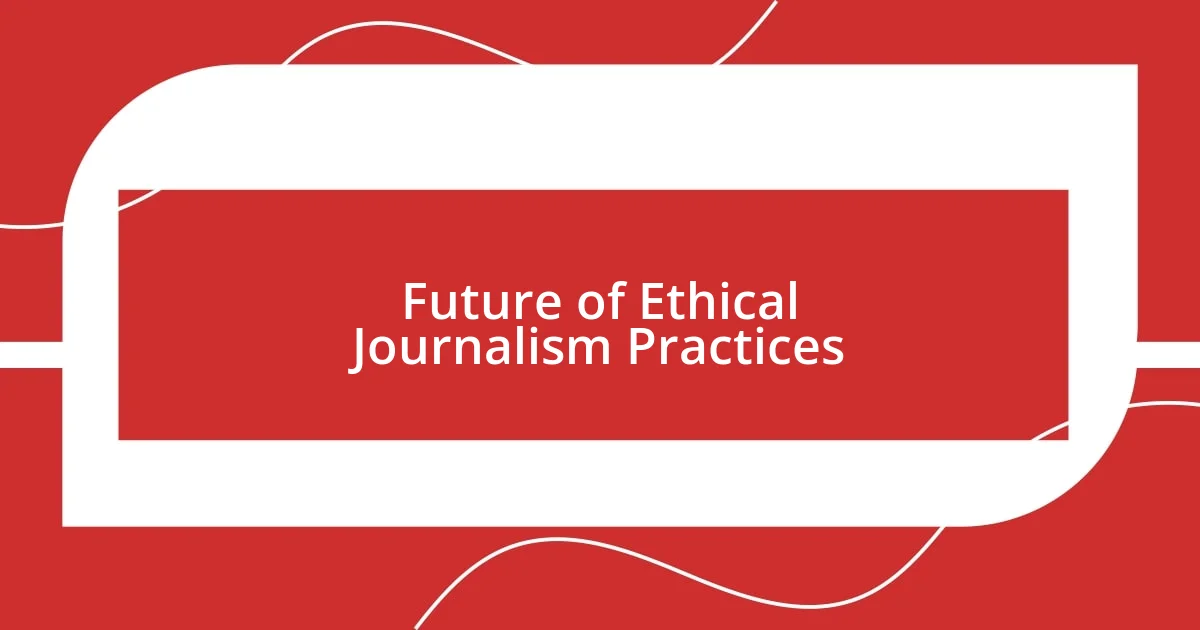
Future of Ethical Journalism Practices
It’s intriguing to think about how the landscape of ethical journalism will transform in the coming years. I’ve noticed a growing emphasis on transparency, and I believe this will shape future practices. For example, when I recently attended a panel discussion, a journalist shared how they openly disclose their sources and decision-making processes. This level of transparency builds trust and invites the audience into the journalistic journey, fostering a more engaged readership.
Moreover, technology plays a crucial role in redefining ethical standards. Innovative tools for fact-checking and source verification are emerging, making it easier for journalists to uphold their commitments to accuracy. I remember experimenting with a new software that flagged potential misinformation in real-time during a live report. It empowered me to stay accountable and ensured that the viewers received reliable information. Isn’t it fascinating how technology can enhance our responsibility rather than overshadow it?
As we move forward, the importance of mental health and well-being in journalism is coming to the forefront. I find myself reflecting on the toll that constant scrutiny and pressure can take on reporters. I once faced burnout during a particularly intense season of breaking news. It made me realize that supporting journalists emotionally and psychologically is just as critical as ethical reporting itself. How will newsroom cultures adapt to prioritize mental health alongside high standards of journalism? I believe it’s an essential conversation that’s starting to arise, and embracing it could lead to healthier, more ethical practices in the industry.










